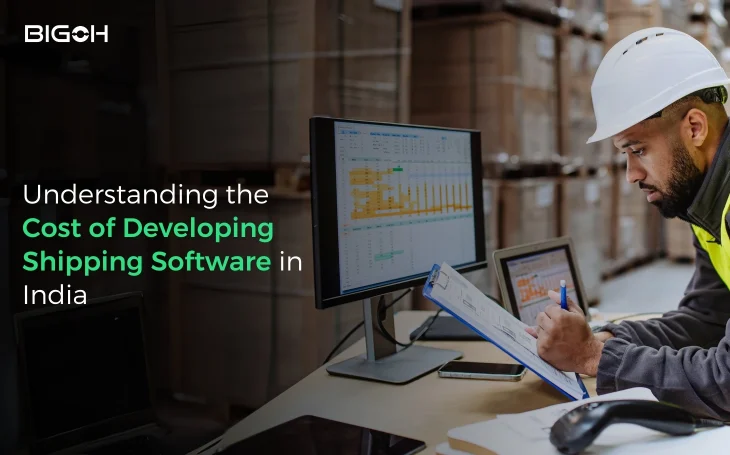
Every business, whether it’s transportation, retail, or a mid-size e-commerce brand, needs logistics solutions. Logistics is the lifeblood of any organization without which it can’t survive. A little disruption in the supply chain affects the financials of businesses.
A survey conducted in 2020 (in which 41% of supply chain decision makers participated) stated that supply chain issues caused businesses to lose revenue of 50-100 million US dollars.
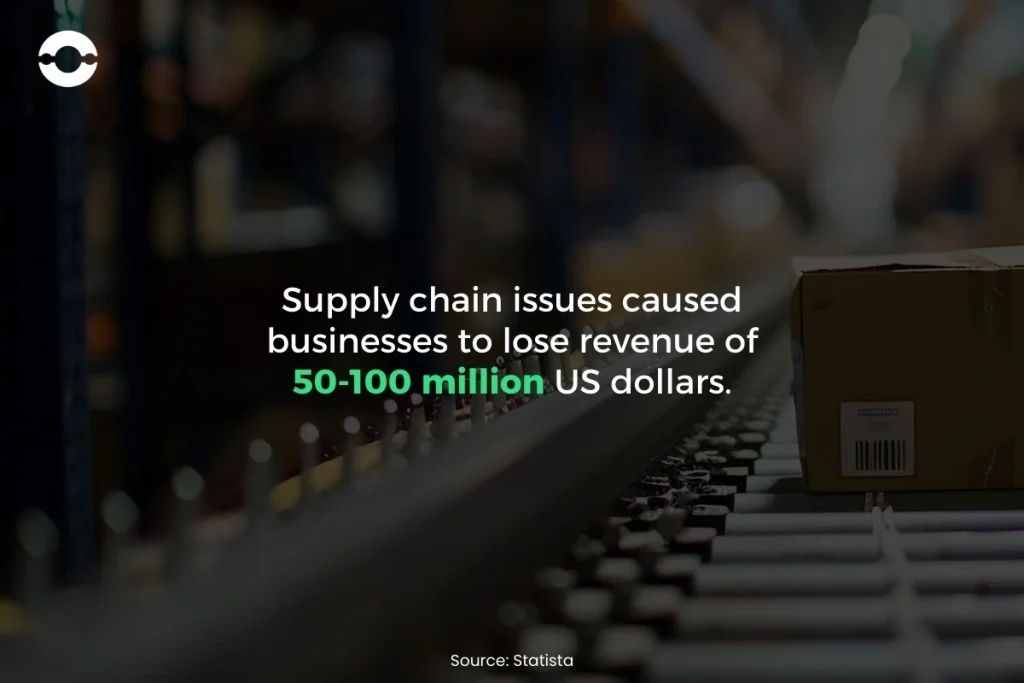
The #1 goal of every shipping business is to deliver products faster to end users with minimal transportation costs. However, most businesses overlook the importance of logistics, which adds more expenses leading to a sudden drop in revenue.
As technology is making strides in every industry, there is a need to integrate software solutions in logistics as well. Integration of logistics software provides several advantages to businesses:
- Manage inventory levels
- Provide better customer service
- Find the most optimal route
- Reduce fuel consumption costs
- Make better business plans
- Get real-time tracking facility
And the list goes on.
Let’s dive into the blog to learn about the nuts and bolts of shipping management software, its benefits, and how much does it cost to develop shipping software.
Overview of Shipping Management Software
When your business progresses and runs on a large scale, shipment becomes a resource and time-intensive task. You need logistics software, a digital solution for tracking shipping orders from procurement stage till the delivery cycle.
Initially, companies spend more time and effort on manual documentation, tracking orders, fulfilling shipping tasks, and communicating with multiple carriers.
Usually, shipment companies receive a huge number of orders daily, and it becomes challenging to track which items must be sent and when.

This is where the need to create customized shipping software exists to streamline supply chain issues, manage loads of inventory, and track shipment processes.
From the moment the order is placed until the time of its delivery, the shipping management system has a major role to play. It does all the heavy lifting for logistics and transportation companies in the form of:
- Order processing
- Packaging
- Tracking shipments
- Calculating the cost of delivery
Such automation not only saves time for your staff but also enhances customer satisfaction as they get goods and services on time.
As a result, the efficiency of the shipping and logistics company increases as there’s a smooth flow in the movement of goods and services from point A to point B.
What are the features of Shipping management software?
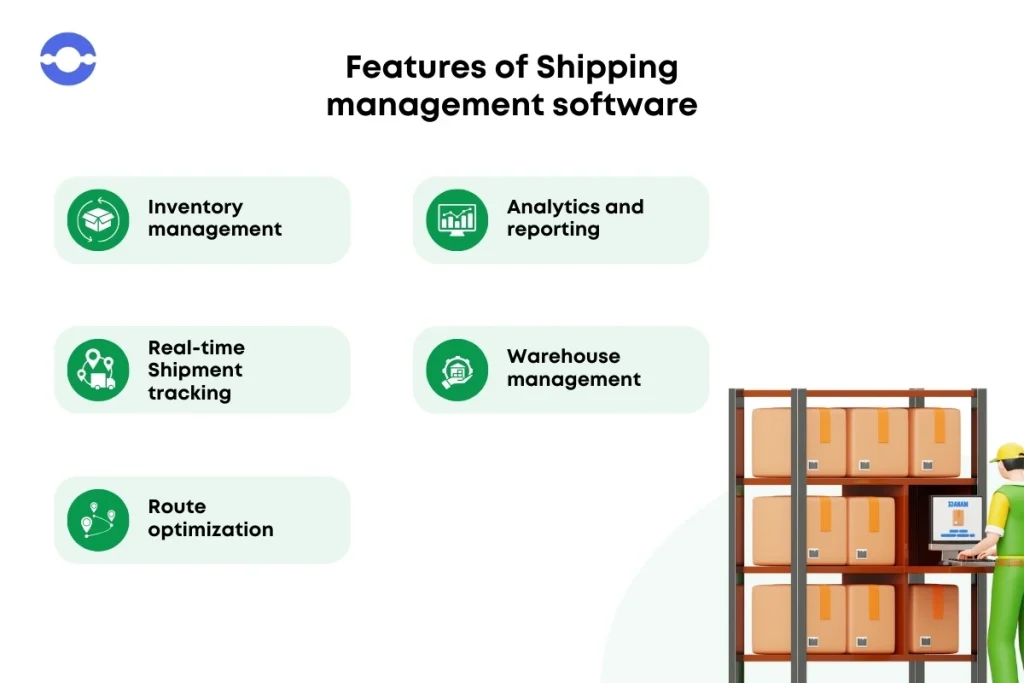
When developing custom logistics software, you need to include core features that enhance the efficiency of your supply chain operations.
Here are the features of Shipping management software which are as given below-
1. Inventory management
An inventory control feature enables logistics companies to track the movement of goods from procurement to storage so they can meet the demands of customers quickly.
Let’s say an organization uses the old-school approach of manually tracking the orders through spreadsheets, they won’t be able to get real-time visibility in managing inventory.
As a result, a little delay in shipments results in a loss of sales opportunities and affects your organization’s reputation.
2. Real-time Shipment tracking
A real-time tracking feature enables the logistics and supply chain managers to get step-by-step updates on when shipments will be delivered.
As they get access to live shipment updates from procurement to distribution (location of shipment, delivery time, etc.), they can effectively manage the supply chain and identify the loopholes as to why there is a delay in order delivery.
On the flip side, this feature is advantageous for customers as they can get real-time updates about where the order is and when it will arrive.
3. Route optimization
Integration of AI-powered features in mobile apps enables logistics businesses to decide the most optimal route by considering various factors such as weather conditions, current traffic, distance, etc.
This way they can complete the maximum number of deliveries in less time. More importantly, they can save their fuel cost and provide faster delivery of goods to the user.
4. Analytics and reporting
Reporting and analytics are the MUST-HAVE features while developing the shipping software. A custom logistics software creates detailed reports and shares insights on inventory turnover, transportation deliveries, order fulfillment, fuel consumption, etc.
Thus, logistics companies can leverage the power of reporting capabilities and fine-tune their shipping processes.
5. Warehouse management
If you have multiple warehouses for storing goods, you need logistics software to track stored goods, see whether products are placed in optimal condition, and monitor the movement of goods.
As everything is automated, shipping processes become quicker.
Benefits of Shipping Management Software
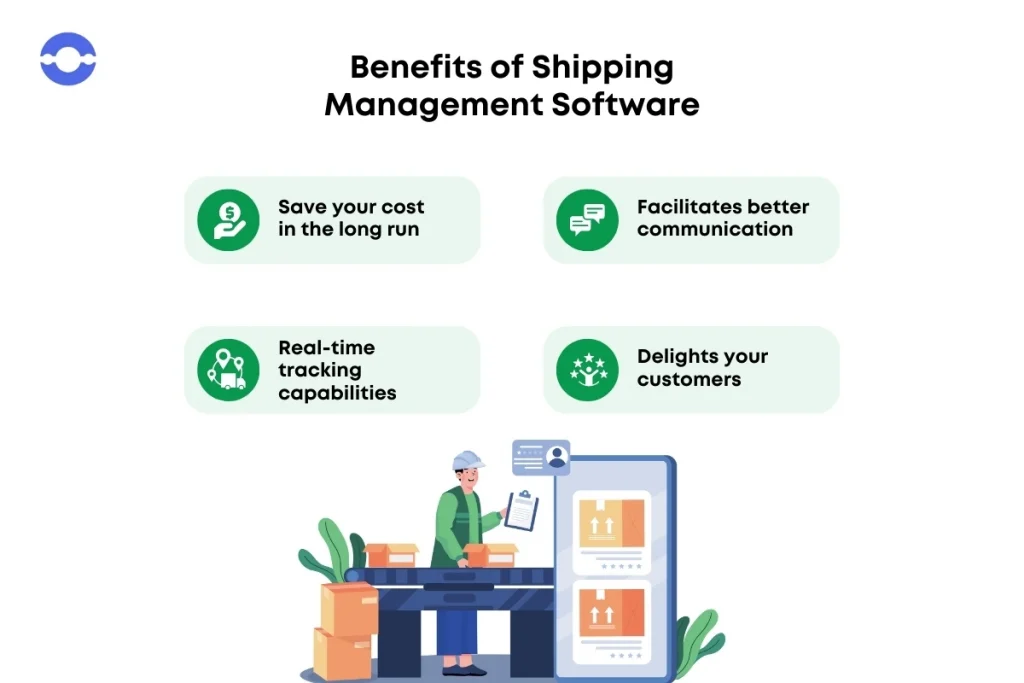
Investing in logistics and shipping management software can be game-changing as it provides a handful of benefits such as enhancing the supply chain workflow, faster order processing, and managing warehouse processes.
Let’s discuss them in detail –
1. Save your cost in the long run
Automation eliminates time-consuming yet tedious tasks such as order processing and inventory management. Additionally, a huge part of business goes into logistics costs.
Custom logistics software development company ensures that businesses can maintain sufficient piles of inventory that are neither understocked nor overstocked. This way they can save their funds and retain them for expanding their division.
Automation = less human intervention = reduced labor costs
Additionally, Logistics software is a cost saver technique for companies as it recommends the optimal route considering various factors such as road congestion, weather conditions, traffic, etc. Thus, it enhances operational efficiency through speedier deliveries in less time with a reduced cost.
In a nutshell,
A lower logistics cost equates to the high profitability of the enterprise
2. Real-time tracking capabilities
Logistics management software provides real-time insights into your supply chain operations by tracking shipments, monitoring inventory levels, and identifying the causes that cause delays in shipment.
Thus, businesses can monitor the tracking of goods in real time and identify the loopholes that cause a delay in the delivery of goods. Moreover, it sends regular updates to the customer about the shipment and provides better customer service.

3. Facilitates better communication
The logistics software leaves no space for communication gaps as it fosters better collaboration between various stakeholders involved in the supply chain including customers, carriers, and suppliers.
A centralized platform ensures that everyone is in the same loop. Thus, every stakeholder is informed about shipping statuses, order fulfillment processes, or if there are delays or changes.
4. Delights your customers
The real-time tracking capabilities allow businesses to keep their customers in a loop throughout the shipment process so they won’t worry about when and where the parcel will arrive.
By delivering orders in a timely way, they’re not just meeting customer demands, but rather providing a hallmark for exceptional quality service.
In a nutshell, better customer experiences drive higher customer loyalty.
Cost of shipping software development
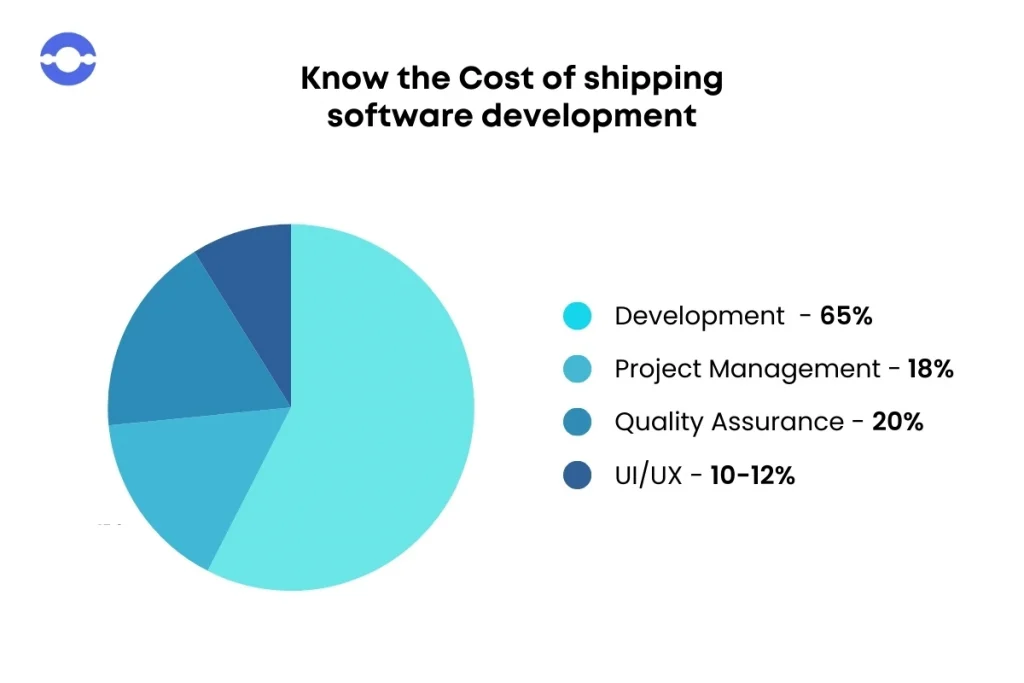
The cost of developing shipping software starts with a starting price of $25,000. And it can go up to any limit depending on various factors that affect the development cost.
These factors include features and functionalities, technologies required, type of app required, how complex the application is, and whether it can be integrated with third-party vendor apps.
Let’s dive right into these factors as given below-
1. Features and functionalities (Basic/Advanced)
The cost of developing shipping software increases with the type of features you add. The more complex features you add, the higher the development cost.
If you go with developing a ready-made app, then it would cost less bucks. While developing customized shipping software adds more development expenses. It will indeed save money in the long run.
Adding basic features to the software such as order processing, inventory management, and warehouse management would cost less.
Creating a logistics application with more advanced features and functionalities (real-time tracking, route optimization, reporting and analytics, personalized recommendations) increases your development cost as it requires more development efforts.
It’s a wise decision to create a balance between functionality and cost.
2. Type of Shipping app
The cost also varies depending on what type of application you are creating.
As a Shipping software development company, we deal in n number of apps depending on your business requirements such as –
- Customer app
- Logistics and supply chain managers app
- App for Warehouse operators
- An app for Delivery partners
- An app for the admin panel
3. Location of development team
The location of the development team is another factor that affects the logistics software development. Hiring developers from Western Europe and North America is significantly higher than outsourcing from regions such as Asia countries (India, China).
4. Technology stack
The choice of tech stack increases your development cost. Supposedly, if an app requires complex features and functionalities, then it requires the expertise of highly technical programmers who are of course expensive to hire.
Thus, the choice of tech stack, libraries, and frameworks determines the overall development cost.
5. Post-launch support and maintenance
Whether the dedicated development team provides post-launch support and maintenance?
If they provide ongoing support to fix bugs, add features, or update the mobile app or website, then it would raise the cost of development.
6. Integrations with third-party apps/systems
Integration of logistics apps with third-party systems (CRM, ERP system, etc.) increases the overall development costs. Seamless integration facilitates synchronization of data exchange, ensuring that everything works smoothly because systems can communicate.
An integrated logistics system ensures that there will be no discrepancies, and no manual errors in supply chain operations.
Such integration enables the shipping businesses to enhance their workflow, streamline their supply chain tasks, and send timely updates to customers.
Wrapping up
The above guide has given you enough reasons why investing in shipping software is a profitable choice for your business.
If you want to operate globally, you need an advanced logistics solution that can help your business achieve a competitive edge, optimize your supply chain operations, and reduce your transportation costs.
As a business entrepreneur, you might want to know how much it costs to develop shipping software.
But at the same time, finding a reliable app development company that doesn’t compromise with the app quality should be your top-notch priority.
As a logistics software development company, we know how to create scalable digital solutions that reduce your transportation costs by 30% and increase your operational efficiency.
We deal in creating custom logistics solutions for businesses including predictive analytics apps, transportation management systems, supplier collaboration apps, document management apps, etc.
No matter whether you need a basic or a complex logistics application, we’re the perfect fit for your business needs. Just tell us your business idea and we’ll convert it into a live application that helps you manage your logistics operations with ease.




